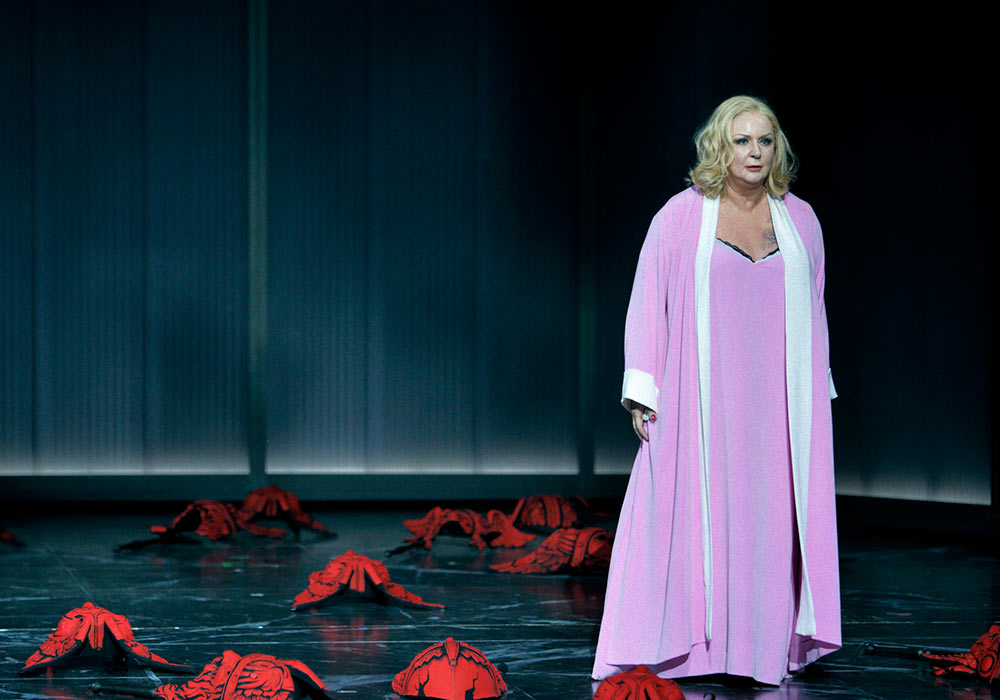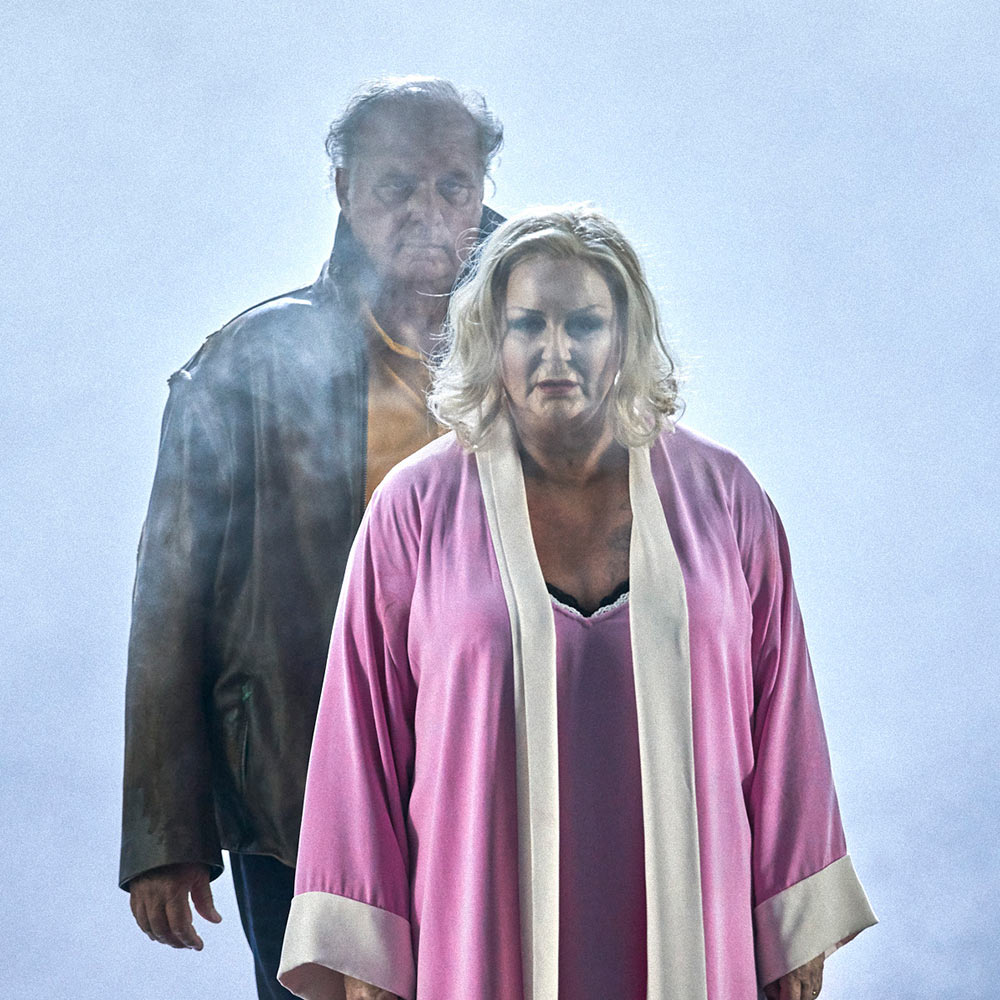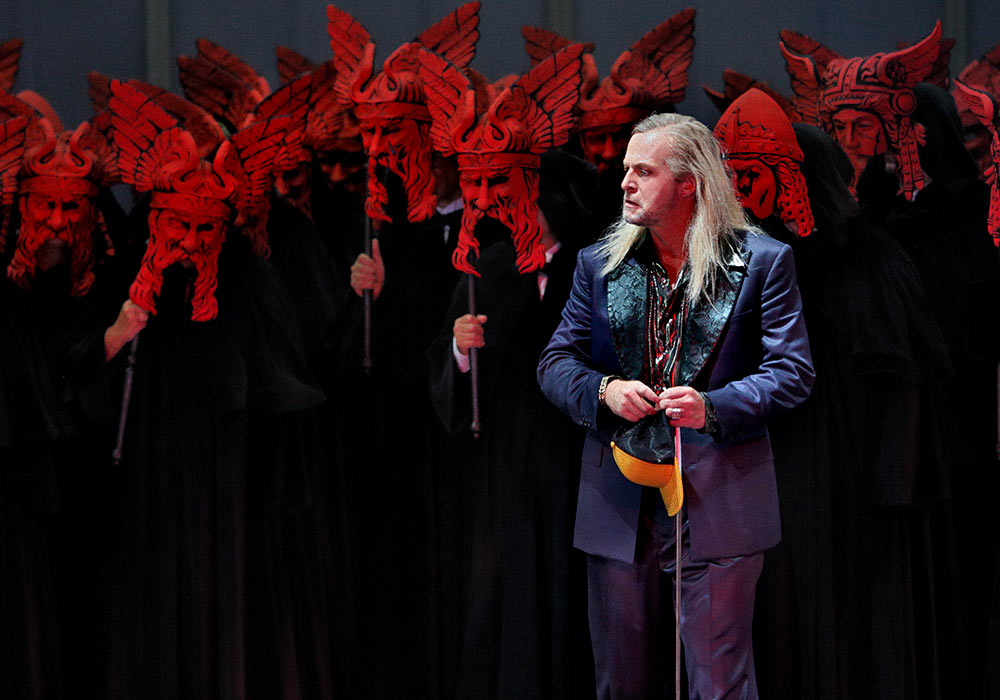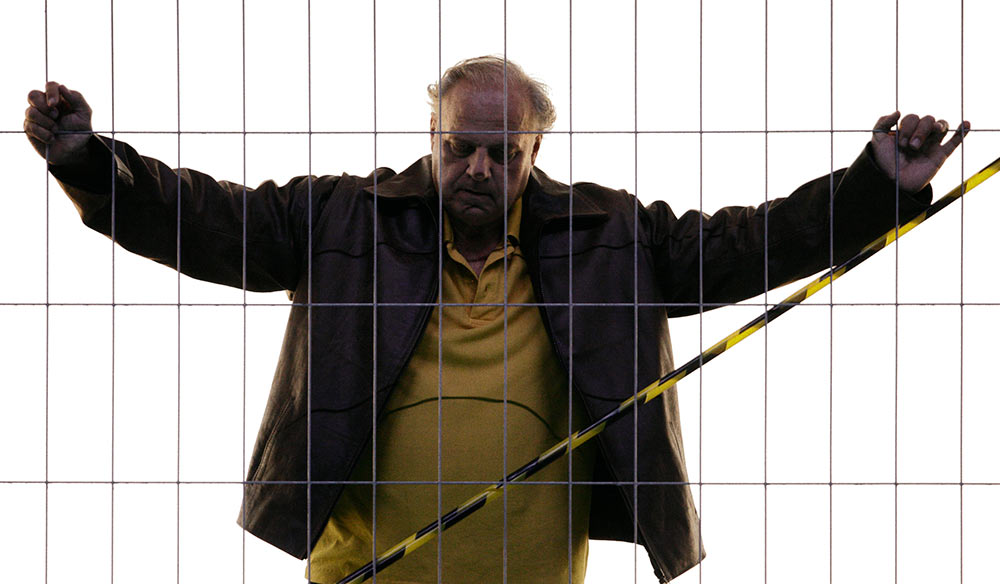Götterdämmerung (Valentin Schwarz / Cornelius Meister): Bayreuth Festival 2022 - Der Ring des Nibelungen
![]()
The Norns, nightmarish looking creatures. Costumes by Andy Besuch. The Norns were sung by Okka von der Damerau, Stéphanie Müther and Kelly God. (Photo: Enrico Nawrath, Bayreuter Festspiele)
Siegfried – Clay Hilley
Gunther – Michael Kupfer-Radecky
Alberich – Olafur Sigurdarson
Hagen – Albert Dohmen
Brünnhilde – Iréne Theorin
Gutrune – Elisabeth Teige
Waltraute – Christa Meyer
First Norn – Okka von der Damerau
Second Norn – Stéphanie Müther
Third Norn – Kelly God
Woglinde – Lee-an Dunbar
Wellgunde – Stephanie Houtzeel
Flosshilde – Katie Stevenson
Grane – Igor Schwab
Valentin Schwarz (director)
Andrea Cozzi (designs)
Andy Besuch (costumes)
Konrad Kuhn (dramaturgy)
Reinhard Traub (lighting)
Luis August Krawen
Bayreuth Festival Chorus (chorus master: Eberhard Friedrich)
Bayreuth Festival Orchestra
Cornelius Meister (conductor)
![]()
Valentin Schwarz. (Photo: Enrico Nawrath, Bayreuter Festspiele)
Valentin Schwarz’s Ring ends more or less where it began, bar curtain-calls in which the long-awaited appearance of Schwarz and his team was greeted by the most intensive booing I have ever heard. I suppose a ‘cyclical’ turn will appeal to some who insist on referring to the Ring as a ‘cycle’, when it is nothing of the sort. Even those, however, who discern some kind of return at the close will have wanted a little more for their money than a hasty, borderline-cynical return of dual umbilical chord babies on video, and, prior to that, of a swimming pool for the Rhine.

Gutrune (Elisabeth Teige), taking a selfie, and Gunther (Michael Kupfer-Radecky) on the sofa. (Photo: Enrico Nawrath, Bayreuter Festspiele)
Schwarz’s unwillingness or inability to formulate any kind of concept, let alone to present it successfully, has long since had hopes for drama run out of steam. Unwillingness—let us be charitable—to carry though any coherent correspondence between objects, themes, even often characters, leaves us with an incoherence that does not register as an aesthetic challenge, but simply as a careless mess. Siegfried apparently forgot to take Notung with him—or rather, the director forgot that he should. It was there, but Brünnhilde kept it, storing up various trouble for a final scene to the first act. This is not a matter of highlighting contradictions, already existing or even newly created. It is not freely associating; indeed, it is barely associating at all. It seems to speak more than anything of lack of acquaintance with Wagner’s work and—which may or may not be fair—sheer laziness. Like a child with an extremely limited attention span, Schwarz presents something, tires of it, presents a new thing without bothering to connect it to the previous thing, and continues. Occasionally, some older things return, yet neither with dramatic reason nor insight. To list them is almost the only thing one can do, given such absence of the conceptual; but it quickly becomes tedious, so I shall try to remain (relatively) selective.
The dark-haired boy we first saw in Das Rheingold shooting others with a water-pistol at the swimming pool seems in some sense to have become the gold, the ring, young Hagen, and now—oddly, having aged far faster than everyone else—‘old’ Hagen. A girl, who may or may not be the same as one also marked out at the swimming pool, who in turn may or may not be the same as the one Erda a little later seemed keen to protect, seems at times to take on the mantle of the ring, although there is also from time to time a ring too (which, given generally dim lighting, most of us can barely see). What we are supposed to make of that girl’s disappearance during the final scene, or indeed anything much in a scene that sadly had many in the audience laughing at its sheer ineptitude, I have no idea. Hagen’s return right at the end, stumbling on to shout ‘Zurück vom Ring’ (is he advising people to stay away from himself?) and then stumbling back off again, was not the least embarrassing episode in a renewed, though hardly rejuvenated, string of scenic non sequiturs.

Hagen (Albert Dohmen) left, and Gunther (Michael Kupfer-Radecky) kissing Siegfried (on this photo Stephen Gould, but Clay Hilley stepped as Siegfried 5 August since Stephen Gould was sick. (Photo: Enrico Nawrath, Bayreuter Festspiele)

Hagen (Albert Dohmen) and Gunther (Michael Kupfer-Radecky). (Photo: Enrico Nawrath, Bayreuter Festspiele)
Personal assistant Grane is still around too. It is hardly unusual for the gods to have nothing god-like to them at any stage whatsoever, though such is at best a one-sided view. Rarely if ever before, though, can they have been so recklessly divested of all character, even much in the way of motivation, and for that to have been the fate of dwarves, giants, heroes, and humans too. Turning a horse into a man in a suit does not seem much compensation, or even relevant. Anyway, Grane goes with Siegfried into the world (actually, back to part of Fafner’s house, I think) to encounter a Gunther who slightly resembles Peter Stringfellow or even Jimmy Savile, but whose inspiration a German friend tells me is a trashy television series called Die Geissens – eine schrecklich glamouröse Familie. Gunther wears a sparkly top that asks ‘Who the fuck is Grane?’ Quite, though one might ask that about anyone here, really. Grane is later beaten to something not a million miles from horsemeat. Gunther leaves the carrier bag with pieces of his body by the pool for Brünnhilde in pink dressing gown eventually to pick up Grane’s head to sing to. The unfortunate image resembles Golden Girl Rose Nylund doing a turn as Salome on her way to collect midnight cheesecake, albeit with none of the fun or interest that might entail.

Irene Theorin as Brünnhilde. (Photo: Enrico Nawrath, Bayreuter Festspiele)
But poor Brünnhilde (seriously). She too has been subjected to pretty horrific, all too casual abuse, seemingly to no end other than as something else to do (and not in a Clockwork Orange sort of way either). How much, if at all, violence towards women should be depicted on stage (or screen), especially by men, is of course very much a live topic at the moment. There may be no definitive answer, yet it is hardly a question simply to be ignored or, worse, trivialised. So many important questions, moreover, are treated similarly. Alberich’s alleged inability to father Hagen—‘it is not entirely clear’, writes dramaturge Konrad Kuhn in the programme, ‘how he could have conceived a son’—is at best problematical. ‘How,’ asks Kuhn, ‘did this “nasty”, this “hairy and hideous imp” … beget a child with the proud Queen Grimhild?’ Perhaps using the power he has amassed by foreswearing love? There is not much of a mystery, here, really, let alone inconsistency, though what form of power is of course open to speculation and interpretation. Instead, though, we end up with something that trivially disrupts the very parallelism the production seems to wish to construct between Wotan and Alberich, and arguably has more than a pinch of ableism to it. (Some might argue racism too; let us leave that for another day.)
![]()
Cornelius Meister. (Photo: Enrico Nawrath, Bayreuter Festspiele)
Even Cornelius Meister’s conducting, a solid highlight of the previous three evenings, proved more mixed here. There is no shame in that; many conductors, at the best of times, are more successful in some parts of the Ring than others. That the prologue and first act in particular dragged, often seeming to lie behind whatever notional basic tempo had been set, was nonetheless unfortunate as nonsense upon nonsense unfolded onstage. That episodic quality continued into the second act, received with unusual rapture by the audience, but which to me lunged and lurched too often, making all too little musical sense. The third act, though, was much better, a sense of form as living structure once again imparted. There is no reason to think that the rest of the work will not follow in time. The Bayreuth Festival Orchestra, doubtless understandably, sounded at times tired. As an audience member, one could certainly relate. There were some splendid passages too, but this was not a vintage night for Wagner musically.

Hagen (Albert Dohmen) and Brünnhilde (Irene Theorin). (Photo: Enrico Nawrath, Bayreuter Festspiele)
If vocal performances did not always reach the heights, nor did they ever fall below a reasonable level. Olafur Sigurdarson’s Alberich and Albert Dohmen’s were typically intelligent portrayals, founded in the poem and employing its musical marriage to considerable effect. Insofar as one could avoid Schwarz’s weird conception of Gunther—was he supposed to be high, or just very, very peculiar?—the same could be said of Michael Kupfer-Radecky in that role. If quality of diction came and went, there was much to appreciate in Iréne Theorin’s Brünnhilde, who managed to maintain a considerable degree of dignity, events around here notwithstanding. Fullness and bloom of voice were often as impressive as her sheer resolve to get on with it. Clay Hilley, a very late substitute as Siegfried, did more than could reasonably be asked of him. Not once did his voice tire; he committed himself with apparently equally enthusiasm to what was going on dramatically. Elisabeth Teige’s Gutrune was not helped by the production—who was?—but was a convincing vocal performance. Waltraute did not suit Christa Mayer quite so much as Fricka, but there was little doubting the quality of verbal response. The Rhinemaidens and Norns were all very good. If the chorus was far from overwhelming in the Vassals’ Scene, perhaps Covid restrictions were still in play; it looked as well as sounded smaller than usual.

Gunther (Michael Kupfer-Radecky) and the vassals. (Photo: Enrico Nawrath, Bayreuter Festspiele)

Elisabeth Teige as Gutrune. (Photo: Enrico Nawrath, Bayreuter Festspiele)
It made for a long and dispiriting evening, though. I am only too aware of precedents, of how, say, Patrice Chéreau’s first run met with uproar and incomprehension, proceeding to become perhaps the best loved (and esteemed) Ring of all time. Not having been there, I can only speculate, but many have said it improved radically during its stint, a tribute to Bayreuth’s Werkstatt principle. Perhaps this might too, then; or perhaps I might change my mind and come to recant, as I did with Frank Castorf (parts of whose production I had, though, always admired). No one would be happier than I to admit he was wrong if so. It is far from the case that every idea advanced is unworthy of consideration; the problem more is that the production itself barely deigns to extend that consideration, already having jumped on something else. I think there would have to be a greater willingness, indeed any at all, to extend the frame of reference beyond a rich, unlikeable family. Why should we care, if that is all there is? Characterisation would help, to put it mildly, but so would a sense of the political and indeed the religious—of context whether broadly, specifically, or both (ideally). There is, it seems, no getting around that—and it is unclear why Schwarz, Kuhn, and company are so determined to try.

Hagen (Albert Dohmen). (Photo: Enrico Nawrath, Bayreuter Festspiele)
Mark Berry is Professor of Music and Intellectual History at Royal Holloway, University of London and will be a visiting scholar at the Humboldt University, Berlin, for the academic year 2023-4. He is the author of Treacherous Bonds and Laughing Fire: Politics and Religion in Wagner’s ‘Ring’ (2006), After Wagner: Histories of Modernist Music Drama from ‘Parsifal’ to Nono (2014), and Arnold Schoenberg (2019), and co-editor with Nicholas Vazsonyi of The Cambridge Companion to Wagner’s ‘Der Ring des Nibelungen’ (2020). His reviews of concert and opera performances are collected on his blog, Boulezian.
Reviews by Mark Berry on Wagneropera.net
Bayreuth Festival
- Bayreuth 2022: Das Rheingold (Valentin Schwarz / Cornelius Meister)
- Bayreuth 2022: Die Walküre (Valentin Schwarz / Cornelius Meister)
- Bayreuth 2022: Siegfried (Valentin Schwarz / Cornelius Meister)
- Bayreuth 2022: Götterdämmerung (Valentin Schwarz / Cornelius Meister)
- Bayreuth 2019: Tannhäuser (Tobias Kratzer / Christian Thielemann)
- Bayreuth 2019: Lohengrin (Yuval Sharon / Christian Thielemann)
- Bayreuth 2019: Die Meistersinger von Nürnberg (Kosky/Jordan)
- Bayreuth 2019: Tristan und Isolde (Katharina Wagner/Christian Thielemann)
- Bayreuth 2017: Die Meistersinger von Nürnberg (Kosky/Jordan)
- Bayreuth 2017: Parsifal (Uwe Eric Laufenberg / Hartmut Haenchen)
- Bayreuth 2017: Das Rheingold (Frank Castorf / Marek Janowski)
- Bayreuth 2017: Die Walküre (Frank Castorf / Marek Janowski)
- Bayreuth 2017: Siegfried (Castorf/Janowski)
- Bayreuth 2017: Götterdämmerung (Castorf/Janowski)
- Bayreuth 2016: Parsifal (Uwe Eric Laufenberg / Hartmut Haenchen)
- Bayreuth 2016: Tristan und Isolde (Katharina Wagner / Christian Thielemann)
- Bayreuth 2016: Götterdämmerung (Frank Castorf / Marek Janowski)
- Bayreuth-2016: Siegfried (Frank Castorf / Marek Janowski)
- Bayreuth 2016: Die Walküre (Frank Castorf / Marek Janowski)
- Bayreuth 2016: Das Rheingold (Frank Castorf / Marek Janowski)
- Bayreuth 2014: Frank Castorf Ring: Das Rheingold
- Bayreuth 2014: Frank Castorf Ring: Die Walküre
- Bayreuth 2014: Frank Castorf Ring: Siegfried
- Bayreuth 2014: Frank Castorf Ring: Götterdämmerung
- Bayreuth 2014: Lohengrin
- Bayreuth 2012: Stefan Herheim's Parsifal
- Bayreuth 2012: Gloger's Dutchman
- Bayreuth 2012: Neuenfels Lohengrin
- Bayreuth 2011: Tannhäuser (Baumgarten)
- Bayreuth 2011: Stefan Herheim Parsifal
- Bayreuth 2011: Marthaler Tristan und Isolde
- Bayreuth 2011: Neuenfels Lohengrin
- Bayreuth 2011: The Ring for Children
More Reviews
- Berlin 2010 Cassiers Ring
- ROH 2009: Loy's Tristan
- ROH 2010: Tim Albery's Tannhäuser
- ROH 2011 Tim Albery's Dutchman
- Daniel Barenboim: Complete Wagner Operas (34 CD)
Bayreuth Festival: More Reviews (Valentin Schwarz Ring)
The Ring
Review: A New ‘Ring’ at Bayreuth Does Wagner Without Magic. Valentin Schwarz’s production of the four-opera epic presents human characters with relations even more tangled than usual. (Zachary Woolfe, The New York Times)
Das Rheingold
In der Neuproduktion von Richard Wagners "Der Ring des Nibelungen" bei den Bayreuther Festspielen bringt Regisseur Valentin Schwarz das Epos feministisch auf Zack. (Süddeutsche Zeitung)
Valentin Schwarz inszeniert „Rheingold“ bei den Bayreuther Festspielen als Auftakt seines „Ring des Nibelungen“. Schlimmer als die Regie sei der Dirigent und die meisten Sänger, sagt unser Kritiker. Er hofft auf die anderen drei Teile. (Deutschlandfunk Kultur)
Im Stil einer Netflix-Serie will der junge Regisseur Valentin Schwarz Wagners "Ring" in Bayreuth erzählen: als Familiensaga, die in unserer Gegenwart spielt. Eingesprungen für den an Corona erkrankten Dirigenten Pietari Inkinen ist Cornelius Meister. (BR Klassik)
Das Rheingold review – no ring, no gold, instead child abuse and abduction drive Bayreuth’s new Ring. Austrian director Valentin Schwarz’s new Ring presents the bold and searing idea that the original sin that drives Wagner’s world of power is the abuse of children. Can it be sustained? (Martin Kettle, The Guardian)
Das Licht der Welt erblicken auch zwei Kinder, die wir im Vorspiel in einer Videoprojektion sehen, die sich wohl schon im Mutterleib spinnefeind sind – Wotan und sein „Schatten“ (C. G. Jung) Alberich. Der Beginn einer großen spannenden Sage? (Matthias Lachenmann)
Am Sonntagabend feierte "Das Rheingold" von Regisseur Valentin Schwarz Premiere bei den Bayreuther Festspielen. Wagners Mythos wird in dieser Neuinterpretation zur Familiensaga der Gegenwart. (Norddeutscher Rundfunk)
„Rheingold“ in Bayreuth Valentin Schwarz lässt Wagners Symbolik leiden: Dass da noch niemand draufgekommen ist: Göttervater Wotan und sein Kontrahent Alberich sind Zwillingsbrüder. Im Video wird die Es-Dur Ursuppe des „Rheingold“-Vorspiels zur Fruchtblase, in der sich zwei Babys friedlich schlafend wiegen. Bis eines dem anderen das Auge aussticht und das andere den einen entmannt. (Kölnische Rundschau)
Nach 25 Minuten kommt es in jedem „Rheingold“ zum Schwur. Alberichs Fluch auf die Liebe im Gegenzug fürs Edelmetall - nur taucht es an diesem Abend gar nicht auf. Denn was ist tatsächlich das Kostbarste? Da wird Regisseur Valentin Schwarz moralisch: Es sind die Kinder, unser aller Hoffnung. Sie werden von diesem abgehalfterten Western-Desperado entführt, auf dass er sie zusammenpferchen und umerziehen kann. (Münchner Merkur)
„Das Rheingold“ in Bayreuth: Poolparty mit Kindesentführung. Der Auftakt mit „Das Rheingold“ war brav und fern von großartig. (Tiroler Tageszeitung)
Die Walküre
Bühnenunfall, Buhgewitter und ein unrunder Ring: Eine Schrecksekunde, ein Bühnenunfall und ein Einspringer, der bejubelt wird. Heftige Buhgewitter gab es auch. Die galten offenbar der Regie von Valentin Schwarz. Der erzählt die Handlung der "Walküre" weiter als Familiensaga im Netflix-Stil. Ein ereignisreicher Abend mit überragenden, traurigen und mittelmäßigen Momenten. (BR Klassik)
Der Ring nimmt an Fahrt auf, was vor allem einer Reihe von exzellenten Sänger:innen zu verdanken ist. Im ersten Aufzug begeistern Georg Zeppenfeld als sonorer, klarer und bösartiger Hunding und Lise Davidsen als präsente Sieglinde, mit einer bombigen Mittellage, über die sie Tiefen und Höhen eindrücklich erreicht. Auch Klaus Florian Vogt kann begeistern, selbst wenn ihm die Partie eigentlich zu tief liegt. (Matthias Lachenmann)
Der Bayreuther «Ring»-Regisseur Valentin Schwarz inszeniert Wagners großes Musikdrama um Gold und Gier, Zwerge und Drachen als moderne Serie über eine verkorkste Familie. Vor allem mit dem Familienoberhaupt gibt es Probleme. (Schwarzwälder Bote)
Siegfried
Schnitzeljagd für Wagner-Nerds: Der schreckliche Drache ist ein todkranker, uralter Mann. Siegfried zieht ihm den Rollator weg, worauf er einen Herzschlag bekommt. Außerdem wird er sicherheitshalber noch erstochen und erstickt. Und so weiter. Ständig ist man am Rätseln und Entziffern. Was erzählt Wagner, was erzählt Schwarz, was ergibt die Differenz. Ergibt sie was? (Bernhard Neuhoff, BR Klassik)
Nachdem man den ersten beiden Abenden viel Positives abgewinnen konnte, überrascht nun Cornelius Meister mit einem zupackenden Dirigat und gutem Zusammenspiel mit dem Orchester, während die Solisten leider schwächeln und die Inszenierung vielen Zuschauern den letzten Nerv raubt. (Matthias Lachenmann)
Götterdämmerung
In der Trash-TV-Sendung „Die Geissens“ erlebt der Zuschauer das Leben einer reichen, wohlstandsverwahrlosten und prolligen Familie, was Valentin Schwarz – nach dem ersten Aufzug der Götterdämmerung zu urteilen – zu seiner Ring-Inszenierung inspiriert hat. Dabei denken wir natürlich gleich an das Rheingold und die Walküre, wo ebenfalls eine reiche Familie zu sehen ist, so dass sich der Ring zur Götterdämmerung schließt. Nur: Was interessieren uns „die Geissens“? (Matthias Lachenmann)
Bayreuther Festspiele: Ob dieser «Ring» zu retten ist, wissen die Götter. Valentin Schwarz erntet für seine wenig schlüssige Neuinszenierung von Richard Wagners «Ring des Nibelungen» fast einhellige Ablehnung. Bei der Musik gibt es Hoffnung, aber die Arbeit muss jetzt erst richtig beginnen. (Christian Wildhagen, Neue Zürcher Zeitung)
Intellektuell und sinnlich erweist sich der neue Bayreuther „Ring“ schließlich als das Fiasko, an das man zuvor drei Abende lang trotzdem nicht glauben konnte. (Judith von Sternburg, Frankfurter Rundschau)
More Reviews
“In a very loose interpretation of Wagner, Valentin Schwarz leads the characters of the complex storyline in "The Ring of the Nibelung" down different paths and into new depths, toward other peaks and climaxes. His "Ring" is a drama of the present, and one about the traumas that are passed down through families across generations. In this interpretation, the Ring is not gold, but a child—children, in fact, are central to his vision, representing the ones who suffer the most from the mistakes and vices of their parents.” (bnn.de)
“In the spirit of the "Bayreuth Workshop," director Valentin Schwarz continued to fine-tune and adjust his much-criticized production this summer, refining it in detail.” (BR-klassik.de)
“This summer at the Richard Wagner Festival in Bayreuth, the world ends in "only" two cycles of The Ring of the Nibelung. Valentin Schwarz's production, as in previous years, creates a lot of noise. Not everything is bad, but the few good elements are hopelessly drowned in the overloaded rest. It's a display of the inability to engage the audience—were it not for the music.” (opernmagazin.de)



